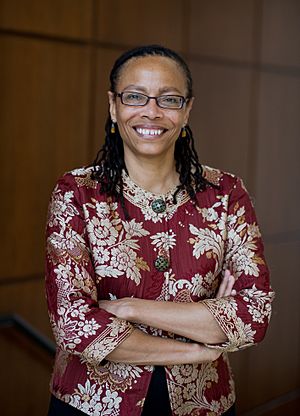Dorothy Roberts facts for kids
Quick facts for kids
Dorothy Roberts
|
|
|---|---|
 |
|
| Born |
Dorothy E. Roberts
March 8, 1956 Chicago, Illinois, U.S.
|
| Education | Yale University (BA) Harvard University (JD) |
| Employer | University of Pennsylvania |
Dorothy E. Roberts (born March 8, 1956) is an American sociologist, law professor, and social justice advocate. She is a professor at the University of Pennsylvania, where she teaches and writes about law, civil rights, and social issues.
Roberts is known for her work on how gender, race, and class are connected to legal issues. She focuses on topics like reproductive health, child welfare (the well-being of children), and bioethics (the study of moral issues in biology and medicine). In 2023, she was elected to the American Philosophical Society. She has written many articles for famous law journals and received a MacArthur "Genius Grant" in 2024 for her important work.
Contents
Early Life and Education
Dorothy Roberts was born in 1956 in Chicago, Illinois. Her parents, who were active in their community, met at the University of Chicago. Her father was an anthropologist, and her mother was his research assistant.
Roberts was an excellent student. She graduated with high honors from Yale University in 1977. After Yale, she went to Harvard Law School and earned her law degree in 1980. After law school, she worked for Judge Constance Baker Motley, a famous civil rights leader and the first African American woman to become a federal judge.
A Career in Teaching and Research
Roberts has had a long career as a professor at several top universities. She started at Rutgers University School of Law and later taught at Northwestern University School of Law. At Northwestern, she was named the Kirkland & Ellis Professor in 2002.
She has also been a visiting professor at Stanford Law School and Fordham University School of Law. As a Fulbright Fellow, she traveled to Trinidad & Tobago to conduct research.
Today, Roberts is a professor at the University of Pennsylvania. She is the founding director of the Penn Program on Race, Science & Society. Her work looks at how race and gender affect people's lives, especially in areas like healthcare and the justice system.
Important Ideas and Views
Dorothy Roberts has shared her ideas through her teaching, writing, and speaking. She believes that many systems in society can be unfair to certain groups of people, especially Black families.
Family and Social Justice
Roberts argues that all women should have the right to decide if and when they have children. She calls this idea reproductive justice. She says this also means women should be able to raise their children in safe and supportive communities.
She believes that government systems, like the child welfare system, sometimes investigate and separate Black families more often than others. She argues that this is often because of poverty, not because the parents are doing anything wrong. She thinks these systems should offer more support to families instead of punishing them.
Race and Medicine
A big part of Roberts's work is about how race is used in medicine. She argues that race is a social idea, not a biological fact. This means there are no "Black genes" or "white genes" that make people different.
She warns that using race in medicine can be harmful. For example, doctors might treat patients differently based on their race, which could lead to worse healthcare. She believes that health differences between racial groups are caused by social inequality and racism, not genetics.
Important Books by Dorothy Roberts
Roberts has written several influential books that explore her ideas in more detail.
Killing the Black Body
In this book, Roberts looks at the history of how Black women's choices about having children have been controlled in the United States. She traces this from the time of slavery to modern policies. She argues that these policies are part of a larger system that has viewed Black women's ability to have children as a problem to be managed. Roberts advocates for a broader idea of reproductive freedom, which includes the right to have children and raise them without unfair interference.
Shattered Bonds: The Color of Child Welfare
This book examines how the U.S. foster care system affects families, especially low-income Black families. Roberts explains that many children are removed from their homes because of issues related to poverty, which can be mistaken for neglect. She shows how Black families are watched more closely by child protective services. The book calls for changes to better support families and address the inequalities in the system.
Fatal Invention
In Fatal Invention, Roberts explores the dangers of treating race as a biological category in science and medicine. She argues that modern genetics and biotechnology are bringing back old, incorrect ideas about race. She warns that this can hide the real causes of inequality and justify unfair treatment.
Torn Apart
This book continues her study of the child welfare system. Roberts argues that the system often investigates and separates Black families for reasons related to poverty, such as not having enough food or a safe place to live. She suggests that instead of punishing families, society should focus on providing economic and social support to help them stay together.
Awards and Honors
Dorothy Roberts has received many awards for her work, including:
- 1998 Myers Center Award for the Study of Human Rights in North America
- 2015 Solomon Carter Fuller Award from the American Psychiatric Association
- 2022 Elected member of the American Academy of Arts and Sciences
- 2024 MacArthur Fellow
She has also served on the boards of several organizations, including the Black Women's Health Imperative and the National Coalition for Child Protection Reform.

